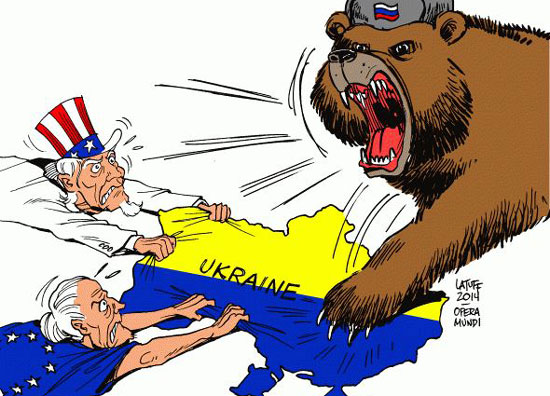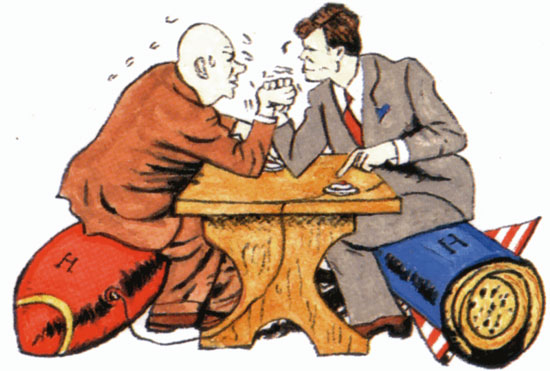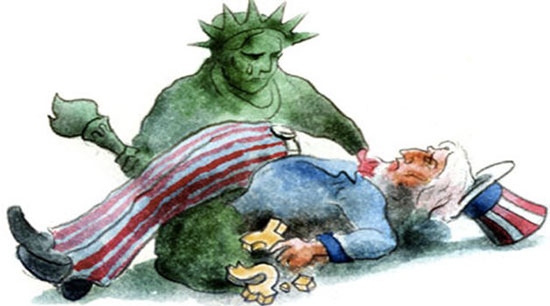World War 3, Information War, and the End of Pax Americana: Exclusive Interview with Eduard Popov
 Eduard Popov, born in 1973
Eduard Popov, born in 1973
in Konstantinovka, Donetsk region, is a Rostov State University graduate with a PhD in history and philosophy. In 2008, he founded the Center for Ukrainian Studies of the Southern Federal University of Russia in Rostov-on-Don. From 2009-2013, he was the founding head of the Black Sea-Caspian Center of the Russian Institute for Strategic Studies, an analytical institute of the Presidential Administration of Russia. In June 2014, Popov headed the establishment of the Representative Office of the Donetsk People’s Republic in Rostov-on-Don. He has actively participated in humanitarian aid efforts in Donbass and has been a guest contributor to various Donbass media, such as the Lugansk-based Cossack Media Group. Popov has actively contributed to Fort Russ since June, 2016. Following is an exclusive interview he gave to Fort Russ on November 5, 2016.
Fort Russ Special Editor Jafe Arnold:
Dr. Popov, for nearly half a year already you have regularly submitted your commentary on global events to Fort Russ . You’ve covered a number of topics ranging from European politics and the war in Donbass to the possibility of a Third World War breaking out over Syria and the future of Ukraine and Ukrainian nationalism.
Dr. Eduard Popov: We live in different countries, speak different languages, and share different (ranging from more or less similar to diametrically opposite) worldviews and political opinions. Nevertheless, to some extent, we are all like-minded. The common denominator for all of us is the strong belief that the world is multifaceted and cannot be reduced to only one correct doctrine.
The history of mankind has seen and will probably still see more than a few attempts at organizing an ideological and political monopoly. The ideology of the American New World Order that claims universality and all-inclusiveness is nothing original and not even clever. As a historian of political ideologies, revolutionary communism in its Trotskyite and Khrushchevite variants also immediately comes to mind, which also claimed for itself the role of ending world history.
But the era of American domination over the world awaits its finale and is maybe more imminent than many of us expect. Restoring the violated principle of national sovereignty instead of the idea of one nation’s global domination, restoring the ‘blooming complexity’ of the world’s cultures instead of an imposed and dull liberal “post-culture”, and affirming solid moral principles instead of immoral promiscuity – this is a sample program which is shared by the majority of humanity. Most of humanity is opposed to the dominant quasi-religion of American neoliberalism or, rather, the ideology of Pax Americana is opposed to the majority of humanity.
The events in the former Ukraine and Donbass have become some of the reference points determining each of our moral position. People from different countries and with opposing political views, from ultra-right to ultra-left, have expressed support for the people of Donbass.

Arnold:
In this context, how do you assess the state of the ongoing global information war?
Popov: It’s difficult for me to assess the state of the whole front of the information war – I don’t possess complete information and don’t consider myself a specialist in this sphere. I’m simply a political analyst and historian specializing in some topics that are relevant in today’s world.
Nevertheless, I have no doubt as to the benefit that “new media” brings to the resistance movement. Let me explain these terms. New media means independent publications that do not legally fall under the category of media, but fulfill the same function. This applies to different websites and groups on social media. The “resistance movement” (I don’t think the origin of the term needs to be explained) is a synonym for anti-globalism or, as has become fashionable to say now, the anti-mainstream.
If De Gaulle’s movement fought against the Nazi occupation of France with weapons in hand, then today’s fighters of the resistance fight mainly with information against an occupant operating not so much with direct physical violence as with distanced coercion, i.e., informational, psychological, economic, and political force etc.
Can it be said that the fight against this new occupation is more difficult? As a historian by education and a philosopher (my doctoral dissertation was on the political philosophy of conservatism), I believe that the world has now arrived at the complete breaking point of one historical epoch and the beginning of another. Perhaps it wouldn’t be so wrong to compare the current era with the era of the collapse of the Roman Empire, first and foremost because ahead of us is most likely a dark age comparable to the early Middle Ages, and a new Great Migration of people. Of course, not everything is the same, but I won’t focus on this now. I’ll just say that there are not too many reasons for historical optimism.
“Big” official publications in Europe are filled with lies. And this is not only my opinion. All the thinking, honest Europeans with whom I’ve discussed the situation of the press in “united Europe” also think so. Hence why, as my friends in European countries have noted, independent media has a growing circle of readership. In my opinion, this trend is a long-term one.
As for what I believe is necessary to concentrate efforts on, the first step has already been done. The minimum social anti-mainstream has been formed in Europe. This has been done primarily thanks to the efforts of the independent press. But in my opinion, the task fulfilled at this first stage has goals primarily centered around negation, i.e., proving what is wrong and dangerous in globalism.
The anti-mainstream wields an unusually rich diversity of worldviews and ideological shades ranging from Marxism to certain currents of fascism to even clerical monarchism. Why not use this methodological richness for forming a united, anti-globalist intellectual front? Then we can proceed to solve constructive tasks, such as discussing the foundations of a future, more just world order.
In no case should the resistance movement identify as marginals – this is precisely how the “Ministry of Truth” tries to present it. If a number of new media take on the mission of creating platforms for intellectual discussions with others, then this will undoubtedly become one of the main tasks of the information war.

Arnold:
A
t the present moment, one of the centers of attention of the information war and what you called the “resistance” is the threat of a Third World War being unleashed by the US. Russian experts have different opinions on how realistic such a turn is. Considering that you say there is little reason to be historically optimistic, what do you think?
Popov: The topic of WW3 is really actively being discussed in Russian expert circles, yet all the while has the status of some kind of fantasy. But as I said earlier, we are now witnessing the breaking point of not only a historical period (what Immanuel Wallerstein calls the “American Century” lasting since 1945), but a change in historical epochs.
This can be compared with the collapse of the Roman Empire or the collapse of the Middle Ages and the onset of the Modern Age. The Russian philosophers of the emigration in the 1920’s foresaw this shift of epochs and called it the New Middle Ages. Perhaps this was also an anticipation of fascism, which lasted a comparatively brief historical period.
In my opinion, this also anticipates the New Middle Ages, but with only one necessary correction: this will be a new early Middle Ages, not the High Middle Ages of great Romano-Germanic culture which the Russian philosopher Konstantin Leontyev considered to be the highest achievement of humanity, but the “dark ages” that preceded it – barbarism, the plague, the collapse of the great ancient cultures, and the mass migration of people. A very vivid impression of these centuries is offered by the German epics (the genesis of the historical basis of the Nibelungen lied dates back to the dark ages and the invasion of Attila the Hun) and Scandinavian mythology, especially the tale of the death of the gods.
This change of epochs is primarily being prepared on mental grounds. I believe that the conditions are ripe for this: the Western world has finally turned into a post-Christian and partially anti-Christian entity. It’s difficult for me to say whether Europe has enough life left in it to oppose the new onslaught of the Caliphate – I have in mind Muslim migration to the European continent and the expansion of Salafist networks. The answer is more likely no than yes.
America is also going through very difficult times, although its difficulties are of an entirely different nature. Wallerstein long ago said that the age of American domination is coming to an end and will end with a grandiose crash. This conclusion is in a certain measure shared by the ideologist of Pax Americana, Brzezinski, who called to negotiate, not to prevent, but to slow down the collapse of the American Empire.
The Americans have a very high level of strategic thought. Both times that America entered a world war on the European continent, it achieved grand strategic successes with very little blood shed (compared to the European Allies and Axis). There are many works that, substantiated by references to historical sources, show that the US stood behind the scenes of WW2 and pushed European rivals to war. The US entered the war as the most powerful economy on the planet and came out with the status of a superpower, the successor to the British Empire. The US’ GDP increased 10 times in only a few years.

We can also see outstanding, though not as tremendous achievements of American geopolitics in WW1. Europe was gushing blood, but the United States profited from and became stronger because of the war between European competitors, even the British. Now that the age of the USA is coming to an end, they are faced with the threat of having to drastically reduce their appetites, busy themselves with overhauling renovations at home, and turn from the lord of the world into a first among equals.
I am almost sure that the US will not go down the path of isolationism for psychological (the inertia of imperial power is very strong) and economic reasons. This means they will continue down the path of foreign expansion.
Russia and China are becoming all the more stronger and independent rivals of the US. Russia is increasing its military power, while China is increasing its economic power, even though it should be noted that China and the US are vitally needed by each other as economic partners at the present stage. Meanwhile, Europe does not wield geopolitical subjectivity and remains the US’ junior partner, but this is threatening its overall economic and productive capacity which is surpassing the US.
I’ll suggest an opinion and perhaps re-invent the wheel: the “Arab Spring” was sponsored by the Americans in order to organize a new great migration of peoples to Europe. In the long and even medium term, the Islamic World is not an ally of the US, but in the short term such an alliance is possible. American strategists are using the mixing of peoples and languages to greatly weaken their European competitors.
Other tools are being used against China and Russia, and this toolbox is quite large. The Americans have attempted to wage a cheap war against Russia by creating a powerful protest movement against President Putin. The Russian people and other peoples of the Russian Federation, unlike their Ukrainian neighbors, wield historical and state wisdom and are ready to endure hardships in the face of an external enemy. This makes war almost inevitable. Time is working against the US and for Russia.
By 2020 or 2025, the program of rearming the Armed Forces of Russia should be completed, and the economy is not in the best condition, but can still cope with crises. Therefore, I’ll repeat, war is an inevitable way out of the impasse.
Will this be a real Third World War? In my opinion, this is unlikely. In one of my articles, I’ve already employed the notion of a “flank war”. The Americans are largely fighting by proxies – Polish, Ukrainian, and Muslim–Salafist ones etc. What is entailed in this scenario? Two things:
(1) – the Russians and Americans will fight without the use of strategic nuclear weapons and on fronts far away from US shores – otherwise, the cure for the American Empire, war, would be worse than the disease;
(2) – I am sure that the American hegemon will be defeated in this war. And this offers the opportunity to begin to liberate Europe, and for Russia this means the opportunity to finally throw off the burdensome shackles of American tutelage.
yogaesoteric
May 8, 2017
